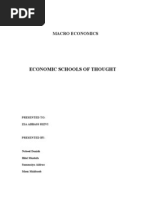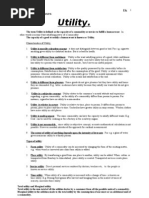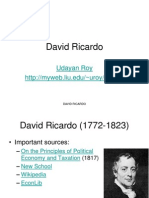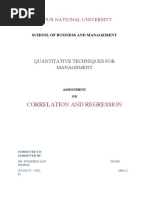0 ratings0% found this document useful (0 votes)
10 viewsAdam Smith Notes
Adam Smith Notes
Uploaded by
indiconicytubeAdam Smith is considered the father of modern economics. His most famous work, The Wealth of Nations, laid the foundation for classical economics. Smith's central idea is the concept of the "invisible hand," which describes how individual self-interest, when pursued in competitive markets, leads to the overall benefit of society. Smith also emphasized the importance of the division of labor in increasing productivity and economic output. While Smith recognized the need for government functions like enforcing property rights, he argued that government should otherwise refrain from interfering in the free market. Smith's ideas have profoundly influenced economics, political theory, and public policy by shaping the development of capitalist economies around principles of free markets and economic liberalism.
Copyright:
© All Rights Reserved
Available Formats
Download as PDF, TXT or read online from Scribd
Adam Smith Notes
Adam Smith Notes
Uploaded by
indiconicytube0 ratings0% found this document useful (0 votes)
10 views2 pagesAdam Smith is considered the father of modern economics. His most famous work, The Wealth of Nations, laid the foundation for classical economics. Smith's central idea is the concept of the "invisible hand," which describes how individual self-interest, when pursued in competitive markets, leads to the overall benefit of society. Smith also emphasized the importance of the division of labor in increasing productivity and economic output. While Smith recognized the need for government functions like enforcing property rights, he argued that government should otherwise refrain from interfering in the free market. Smith's ideas have profoundly influenced economics, political theory, and public policy by shaping the development of capitalist economies around principles of free markets and economic liberalism.
Original Description:
notes about the philosophy of Adam smith
Original Title
Adam Smith notes
Copyright
© © All Rights Reserved
Available Formats
PDF, TXT or read online from Scribd
Share this document
Did you find this document useful?
Is this content inappropriate?
Adam Smith is considered the father of modern economics. His most famous work, The Wealth of Nations, laid the foundation for classical economics. Smith's central idea is the concept of the "invisible hand," which describes how individual self-interest, when pursued in competitive markets, leads to the overall benefit of society. Smith also emphasized the importance of the division of labor in increasing productivity and economic output. While Smith recognized the need for government functions like enforcing property rights, he argued that government should otherwise refrain from interfering in the free market. Smith's ideas have profoundly influenced economics, political theory, and public policy by shaping the development of capitalist economies around principles of free markets and economic liberalism.
Copyright:
© All Rights Reserved
Available Formats
Download as PDF, TXT or read online from Scribd
Download as pdf or txt
0 ratings0% found this document useful (0 votes)
10 views2 pagesAdam Smith Notes
Adam Smith Notes
Uploaded by
indiconicytubeAdam Smith is considered the father of modern economics. His most famous work, The Wealth of Nations, laid the foundation for classical economics. Smith's central idea is the concept of the "invisible hand," which describes how individual self-interest, when pursued in competitive markets, leads to the overall benefit of society. Smith also emphasized the importance of the division of labor in increasing productivity and economic output. While Smith recognized the need for government functions like enforcing property rights, he argued that government should otherwise refrain from interfering in the free market. Smith's ideas have profoundly influenced economics, political theory, and public policy by shaping the development of capitalist economies around principles of free markets and economic liberalism.
Copyright:
© All Rights Reserved
Available Formats
Download as PDF, TXT or read online from Scribd
Download as pdf or txt
You are on page 1of 2
Adam Smith notes
**Notes on Adam Smith's Philosophy:**
1. **Introduction to Adam Smith:**
- Adam Smith (1723–1790) was a Scottish philosopher and
economist, often referred to as the "father of modern economics."
- His most famous work, "The Wealth of Nations" (1776), laid the
foundation for classical economics and remains one of the most
influential books in the history of economic thought.
2. **Theory of the Invisible Hand:**
- Smith's central idea is the concept of the "invisible hand," which
describes how individual self-interest, when pursued in competitive
markets, leads to the overall benefit of society.
- According to Smith, individuals, motivated by self-interest, seek to
maximize their own welfare through voluntary exchange, resulting in
the efficient allocation of resources and the promotion of economic
growth.
- The invisible hand mechanism operates through the market's
price system, which signals supply and demand conditions, guiding
producers and consumers to make optimal decisions.
3. **Theory of Value:**
- Smith's theory of value is based on the labor theory of value,
which suggests that the value of a good or service is determined by
the amount of labor required to produce it.
- He distinguishes between "use value" (the usefulness of a
commodity) and "exchange value" (the amount of other goods that
can be exchanged for it), arguing that prices are ultimately
determined by the relative scarcity of goods and the labor inputs
required for their production.
4. **Division of Labor and Productivity:**
- Smith famously emphasized the importance of the division of
labor in increasing productivity and economic output.
- He uses the example of a pin factory to illustrate how
specialization and the division of tasks among workers can
significantly increase efficiency and output, leading to economic
growth.
- Smith's insights into the division of labor laid the groundwork for
later theories of industrial organization and management.
5. **Role of Government:**
- While Smith is often associated with laissez-faire capitalism and
minimal government intervention, he also recognized the need for
certain government functions to maintain social order and provide
public goods.
- Smith argued that the government should enforce property rights,
maintain public infrastructure, and provide for national defense, but
should otherwise refrain from interfering in the free market.
6. **Legacy and Influence:**
- Smith's ideas have had a profound impact on economics, political
theory, and public policy.
- His emphasis on free markets, competition, and individual liberty
has shaped the development of capitalist economies around the
world.
- While some aspects of Smith's work have been subject to
criticism and reinterpretation, his contributions to economic theory
and his advocacy for the principles of free trade and economic
liberalism continue to inform contemporary debates on economic
policy and governance.
You might also like
- Your Centrelink Statement For Parenting Payment: Reference: 207 828 705JDocument3 pagesYour Centrelink Statement For Parenting Payment: Reference: 207 828 705JLupe VakaNo ratings yet
- Beige and Yellow Classic Vintage Cover Project History Document (A4)Document29 pagesBeige and Yellow Classic Vintage Cover Project History Document (A4)rajvanshananya25No ratings yet
- Class 3 Adam Smith and The Wealth of Nations 28012021Document26 pagesClass 3 Adam Smith and The Wealth of Nations 28012021Ngân Hải PhíNo ratings yet
- Invisible HandDocument19 pagesInvisible HandnandinipoddarqmsNo ratings yet
- Adam SmithDocument12 pagesAdam SmithIshrat Jahan DiaNo ratings yet
- Case Study 2 Adam SmithDocument2 pagesCase Study 2 Adam SmithMinionAddicted100% (1)
- Adam SmithDocument10 pagesAdam Smithisununu11No ratings yet
- Seminar - Notes To Refer (For Major Ideas)Document34 pagesSeminar - Notes To Refer (For Major Ideas)n6zgdmbrrsNo ratings yet
- Chapter 4Document14 pagesChapter 4Maurice ZorillaNo ratings yet
- Development PerspectivesDocument19 pagesDevelopment PerspectivesVilla Rose Zabala RaposasNo ratings yet
- Karl Marx vs. Adam Smith: Consumption: by Ashwin RamanDocument15 pagesKarl Marx vs. Adam Smith: Consumption: by Ashwin RamanpipoNo ratings yet
- Free Markets and Adam SmithDocument4 pagesFree Markets and Adam SmithNeil CochranNo ratings yet
- economy9Document7 pageseconomy9Yani TuscanoNo ratings yet
- Adam SmithDocument1 pageAdam Smithapi-270065235No ratings yet
- Adam Smith Thought in EconomicDocument2 pagesAdam Smith Thought in EconomicAkira KontakuNo ratings yet
- Economic Thought Chapter 1Document6 pagesEconomic Thought Chapter 1mahiletaschalew222No ratings yet
- 199HISTORY-OF-ECONOMIC-THOUGHTSMainConceptsPreparedbyAbdellaMohammedAhmed199Document6 pages199HISTORY-OF-ECONOMIC-THOUGHTSMainConceptsPreparedbyAbdellaMohammedAhmed199tuongvyvn31525No ratings yet
- Adam SmithDocument20 pagesAdam Smithpratik shindeNo ratings yet
- PPT4 Adam SmithDocument24 pagesPPT4 Adam SmithTaufiq Us Samad TonmoyNo ratings yet
- CH 5Document15 pagesCH 5J DNo ratings yet
- Macro Economics ReportDocument21 pagesMacro Economics ReportbilmsyedNo ratings yet
- Classic + Modern LiberalismDocument25 pagesClassic + Modern LiberalismMicky KharbandaNo ratings yet
- Adam SmithDocument5 pagesAdam SmithTrisha Jane LomugdangNo ratings yet
- Economic Thinkers Theme 1 UpdatedDocument8 pagesEconomic Thinkers Theme 1 Updatedkrisretro1No ratings yet
- Invisible HandDocument9 pagesInvisible HandHarsha Billore50% (2)
- Wealth of NationsDocument3 pagesWealth of Nationsbloodberry1017No ratings yet
- Invisible Hand: BeneficialDocument1 pageInvisible Hand: BeneficialJeshika AgarwalNo ratings yet
- Capitalistic Economy: Nations (1776) - Adam Smith (1723-1790), The ScottishDocument1 pageCapitalistic Economy: Nations (1776) - Adam Smith (1723-1790), The ScottishRohit KumarNo ratings yet
- Adam SmithDocument6 pagesAdam SmithJunior MuiamboNo ratings yet
- Adam Smith: History of Economic ThoughtDocument14 pagesAdam Smith: History of Economic ThoughtBrendan RiceNo ratings yet
- Adam Smith & The Wealth of Nations: The Birth of Economics: Financial Dictionary Calculators ArticlesDocument2 pagesAdam Smith & The Wealth of Nations: The Birth of Economics: Financial Dictionary Calculators Articlestharakan77No ratings yet
- Week 4 LiberalismDocument48 pagesWeek 4 LiberalismAtalay ArslanNo ratings yet
- J.D. Ponce on Adam Smith: An Academic Analysis of The Wealth of Nations: Economy Series, #4From EverandJ.D. Ponce on Adam Smith: An Academic Analysis of The Wealth of Nations: Economy Series, #4No ratings yet
- Adam SmithDocument6 pagesAdam SmithxklennahNo ratings yet
- Adam Smith Made His Contribution in TheDocument10 pagesAdam Smith Made His Contribution in TheHrishikesh MahapatraNo ratings yet
- Y11 Inside Cover - CDDocument2 pagesY11 Inside Cover - CDdchavla1No ratings yet
- 1sdfDocument8 pages1sdfsemperparatusussNo ratings yet
- Adam Smith-Hypothetical SampleDocument9 pagesAdam Smith-Hypothetical SamplebarbiebibzzzNo ratings yet
- SCRIPT FinalDocument2 pagesSCRIPT FinalAmmar KattoulaNo ratings yet
- Adam Smith Final Class 1599110820663Document62 pagesAdam Smith Final Class 1599110820663mithun jartarkarNo ratings yet
- Chapter 4 Dev't EconDocument46 pagesChapter 4 Dev't EconTasebe GetachewNo ratings yet
- Capitalist Economic SystemDocument9 pagesCapitalist Economic SystemTesaamaliaNo ratings yet
- Shahbaz PPT 3 ..Document14 pagesShahbaz PPT 3 ..Shahbaz RainaNo ratings yet
- Classical EconomicsDocument54 pagesClassical EconomicsAlionie FreyNo ratings yet
- Uses and Abuses of Adam SmithDocument16 pagesUses and Abuses of Adam Smithjose gabriel reyesNo ratings yet
- Adam Smith, Keynese MarxDocument5 pagesAdam Smith, Keynese MarxDiogo J. PackerNo ratings yet
- Lecture 5 An 6 - FirstAttachmentDocument14 pagesLecture 5 An 6 - FirstAttachmentMaheen AliNo ratings yet
- Aristotle's Economic ThoughtsDocument3 pagesAristotle's Economic Thoughtskranshu8318No ratings yet
- Adam Smith: Liberalism and Modern EconomicsDocument28 pagesAdam Smith: Liberalism and Modern EconomicsThuTaNaingNo ratings yet
- Adam Smith EconomicsDocument3 pagesAdam Smith EconomicsAsis Kaur (Asis Kaur)No ratings yet
- What Is Classical EconomicsDocument2 pagesWhat Is Classical EconomicsUnknown WandererNo ratings yet
- Adam Smith PerspectivesDocument25 pagesAdam Smith PerspectivesdhiyafathimamknNo ratings yet
- Theories of DevelopmentDocument17 pagesTheories of Developmentcoolfaiz2100% (1)
- Evolution of Economic Ideas - Tom NassifDocument10 pagesEvolution of Economic Ideas - Tom NassifJimmyNo ratings yet
- Adam Smith: Managerial Insights From The Father of EconomicsDocument6 pagesAdam Smith: Managerial Insights From The Father of EconomicsMichele QuevedoNo ratings yet
- IPE Classical Approach PresentationDocument14 pagesIPE Classical Approach Presentationranasharafat1No ratings yet
- A Brief History of Economic ThoughtDocument26 pagesA Brief History of Economic ThoughtchandoluthanmayNo ratings yet
- MacroDocument8 pagesMacrosreejasreeNo ratings yet
- Economic Thinkers CaseDocument6 pagesEconomic Thinkers CaseTinotenda DubeNo ratings yet
- 1.5 A Brief History of Economic ThoughtDocument12 pages1.5 A Brief History of Economic ThoughtShiv DewanNo ratings yet
- Adam Smith and "The Wealth of Nations"Document6 pagesAdam Smith and "The Wealth of Nations"PattyNo ratings yet
- Insights On SLFRS 15 Revenue From Contracts With Customers - 1586936561 - Insights On SLFRS 1Document9 pagesInsights On SLFRS 15 Revenue From Contracts With Customers - 1586936561 - Insights On SLFRS 1AmalibuddhikaNo ratings yet
- Kotler and KellerDocument4 pagesKotler and KellerMai Anh DinhNo ratings yet
- Azad-Sir - ParvezDocument31 pagesAzad-Sir - Parvez0084 Arshadul HossainNo ratings yet
- Business EnvironmentDocument148 pagesBusiness EnvironmentRadha ChaudharyNo ratings yet
- Irigaray Women On The MarketDocument11 pagesIrigaray Women On The MarketRed Army 97No ratings yet
- HRA Models - Value Based ModelsDocument53 pagesHRA Models - Value Based ModelsAshish Dhania100% (4)
- Utility.: Ek Taa Utkarsha ClassesDocument5 pagesUtility.: Ek Taa Utkarsha ClassesHemchandra PatilNo ratings yet
- The Meaning of MoneyDocument6 pagesThe Meaning of MoneyChristopher Michael Quigley100% (1)
- As Cigarettes Have Value Independent of Their Use As MoneyDocument3 pagesAs Cigarettes Have Value Independent of Their Use As MoneySanzida Rahman AshaNo ratings yet
- Entrepreneurship Q4 Module6Document18 pagesEntrepreneurship Q4 Module6Herby OcomenNo ratings yet
- Law of Taxation Law of Taxation Class Notes CompressDocument48 pagesLaw of Taxation Law of Taxation Class Notes CompressThrishul MaheshNo ratings yet
- Value Added StatementDocument6 pagesValue Added StatementPooja SheoranNo ratings yet
- David RicardoDocument41 pagesDavid RicardoEduardo AcostaNo ratings yet
- Economics Assignment#3Document6 pagesEconomics Assignment#3muzzammilNo ratings yet
- Labour Welfare ConceptDocument30 pagesLabour Welfare Conceptmanan jainNo ratings yet
- Not ImportantDocument20 pagesNot ImportantespinosazarlynNo ratings yet
- Value-Based Fees - Alan Weiss - Learn Business FasterDocument8 pagesValue-Based Fees - Alan Weiss - Learn Business FasterOskar GrochowalskiNo ratings yet
- Black Book ProjectDocument64 pagesBlack Book ProjectDeepakNo ratings yet
- The Managerial Revolution - James Burnham (1941)Document235 pagesThe Managerial Revolution - James Burnham (1941)topbudget60% (5)
- Value Chain Analysis of Brinjal in The Chittagong Hill Tracts of BangladeshDocument13 pagesValue Chain Analysis of Brinjal in The Chittagong Hill Tracts of BangladeshZara KhanNo ratings yet
- Life Cycle Cost AnalysisDocument32 pagesLife Cycle Cost Analysisaamritaa100% (1)
- Leadership in The 21st Century An OverviewDocument24 pagesLeadership in The 21st Century An Overviewfrancis.binuyoNo ratings yet
- Handbook On GST Rules - 3rd Edn - CA Pritam MahureDocument138 pagesHandbook On GST Rules - 3rd Edn - CA Pritam Mahureminushastri33No ratings yet
- Correlation and Regression: Jaipur National UniversityDocument32 pagesCorrelation and Regression: Jaipur National UniversityCharu SharmaNo ratings yet
- Intrinsic and Instrumental Value NotesDocument1 pageIntrinsic and Instrumental Value NoteshumohugNo ratings yet
- MKT 401 Marketing ManagementDocument210 pagesMKT 401 Marketing ManagementAkase ZechariahNo ratings yet
- 12 Chapter6 PDFDocument42 pages12 Chapter6 PDFMotiram paudelNo ratings yet
- PrashanthaGV OTIS PDFDocument78 pagesPrashanthaGV OTIS PDFSuresh Kumar GuduruNo ratings yet
- Principlesandpracricesof ManagementDocument360 pagesPrinciplesandpracricesof ManagementShikha Arora100% (1)

























































































